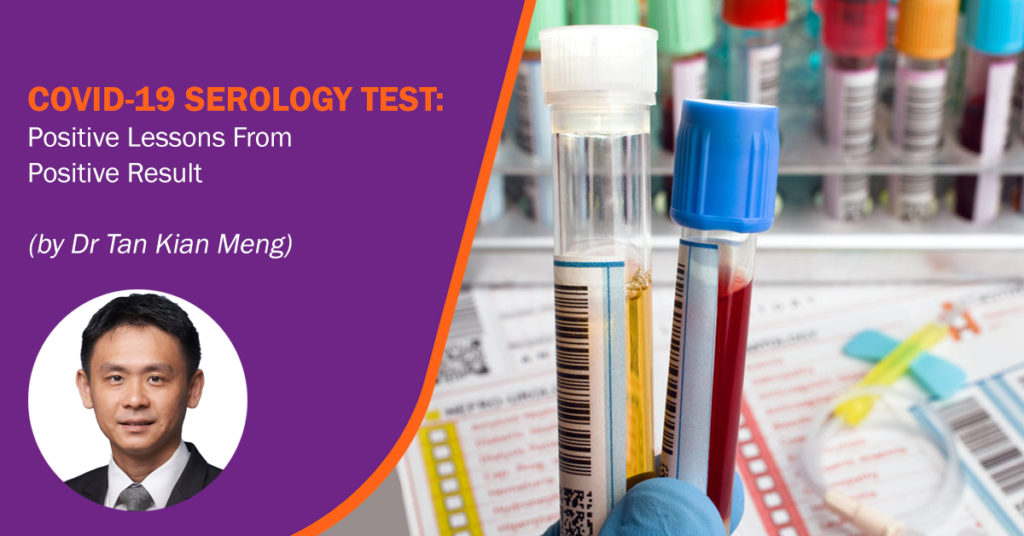It was 9:00 am. What seemed like an ordinary Tuesday turned out to be a rather memorable one for me. I received an urgent telephone call a few minutes into my workday. As soon as I picked up the phone, I heard a voice on the other side exclaiming, “Dr. Tan, did you see your test result? You’ve got COVID!”.
I was befuddled with what I just heard. My brain went into overdrive trying to recall how and where I could have contracted the virus. “What did the result say?” I finally uttered back. The person on the phone commented that my COVID-19 antibody test result showed a very high level of COVID-19 antibodies, also known as the SARS-CoV-2 antibodies. My blood sample had > 250 unit/ml of SARS-CoV-2 antibodies (normal reference range being < 0.8 unit/ml).
Well, you must be wondering why I signed up for this serology test. It all started about one month ago when my aunt, who resides in another country, shared that her friends did not have the required antibodies despite completing their vaccination. To give her an answer and to satisfy my own curiosity, I decided to go for a serology test.
A high (≥ 0.8 unit/ml) level of antibodies basically signifies either 1) a current or past COVID-19 infection, or 2) a positive response to COVID-19 vaccination. Aha! It must be the latter since I am vaccinated. Furthermore, we (healthcare staff within a hospital setting) are being swabbed biweekly since May 2021 and all my swab results have been negative. The laboratory physician, however, gave an indifferent view on things – I was advised to go for a COVID-19 swab test, scientifically known as Polymerase Chain Reaction (PCR) test, to rule out an active infection. With much hesitation, I ended my clinic and went for a swab test that same day.
It was indeed stressful waiting for the PCR test result. Thankfully, the result of my swab test was released the next morning and it was negative (again). I found some time to reflect on this entire ordeal. Below are some points I would like to share:
- Trust science. With a negative PCR test result, this means the high level of SARS-CoV-2 antibodies in my system is likely a direct result of the COVID-19 vaccine. It is also remarkable to point out that the level of antibodies remains high for up to six months since I completed my vaccination in February 2021. Although we are aware that vaccines do not provide bulletproof immunity against COVID-19 infection, they have consistently showed efficacy in preventing symptomatic and severe disease. In short, please get yourself vaccinated if you’re offered a chance.
- Follow protocols. Since the start of COVID-19 pandemic, many organizations and businesses had to rewrite and readapt to new and ever-evolving protocols. On an individual level, we started to adhere to new guidelines such as mask wearing, hand washing and safe distancing. When my antibody counts tested positive, the laboratory physician advised me to undergo a swab test to exclude an active infection. He was merely following his laboratory standard operating protocol. I was initially reluctant to go for ANOTHER swab test as I was certain that the seroconversion was due to vaccination. But I am glad I did. If either of us did not do what we are supposed to do, an infected individual could have gone undetected.
- Stay updated. I have learnt a few new things while researching on “COVID-19 antibody test”. I have learnt that the presence of high level of antibodies does not mean you are immune to COVID-19 infection and high level of antibodies does not necessarily remain high over time. I have also learnt that different vaccines produce different level of antibodies in different individuals. More importantly, I have learnt that there are a plethora of websites and information out there, and we should always learn from reliable sources, such as https://www.moh.gov.sg or https://cdc.gov.sg.
Important note: Routine serology testing is neither recommended nor required to assess vaccine response after completing COVID-19 vaccination under the national vaccination programme.
Dr Tan Kian Meng is a Dental Specialist in Prosthodontics (Teeth Replacement & Cosmetic Dentistry) with Specialist Dental Group®. He received his specialty training in Prosthodontics from University of Maryland, USA. He is also an Adjunct Lecturer with the National University of Singapore, a Visiting Consultant at Singapore’s Khoo Teck Puat Hospital and serving as the Vice President of Prosthodontic Society Singapore. Dr Tan has a special interest in prosthetic and implant restorative dentistry.






